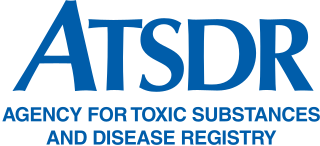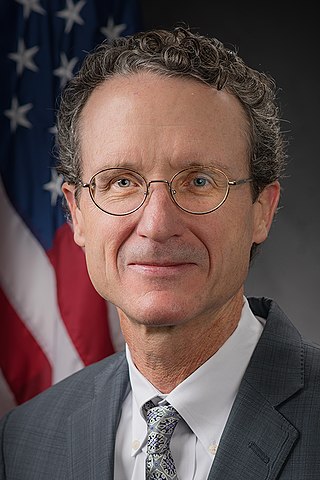David Dunlap is an American lobbyist, and chemical engineer.
David Dunlap is an American lobbyist, and chemical engineer.
He graduated from Virginia Tech. [1]
He was director of Policy and Regulatory Affairs with Koch Industries. [2] [3]
In 2018, he joined the Environmental Protection Agency, Office of Research and Development. [4] [2] [5] He was involved in the EPA's assessment of the health impacts of formaldehyde, a chemical produced by the Koch Industries. [6] Despite having received the recusal statement from the EPA's Ethics Law Office on October 30, Dunlap signed it on December 19, the same day as the EPA blocked the assessment that warned of the carcinogenic and other medical risks linked to formaldehyde. [7] [8] [6] [9] He notably participated in email discussions regarding the assessment at least twice after he agreed to recuse himself and before he officially signed the statement. [8]
He is vice-president of Global Government Relations at Harsco. [1]

The Environmental Protection Agency (EPA) is an independent executive agency of the United States federal government tasked with environmental protection matters. President Richard Nixon proposed the establishment of EPA on July 9, 1970; it began operation on December 2, 1970, after Nixon signed an executive order. The order establishing the EPA was ratified by committee hearings in the House and Senate.

Formaldehyde is a naturally occurring organic compound with the formula CH2O and structure H−CHO. The pure compound is a pungent, colourless gas that polymerises spontaneously into paraformaldehyde, hence it is stored as an aqueous solution (formalin), which is also used to store animal specimens. It is the simplest of the aldehydes and one of the simplest of the carbohydrates. The common name of this substance comes from its similarity and relation to formic acid.

Chemical waste is any excess, unused, or unwanted chemical, especially those that cause damage to human health or the environment. Chemical waste may be classified as hazardous waste, non-hazardous waste, universal waste, or household hazardous waste. Hazardous waste is material that displays one or more of the following four characteristics: ignitability, corrosivity, reactivity, and toxicity. This information, along with chemical disposal requirements, is typically available on a chemical's Material Safety Data Sheet (MSDS). Radioactive waste requires special ways of handling and disposal due to its radioactive properties. Biohazardous waste, which may contain hazardous materials, is also handled differently.

Industrial waste is the waste produced by industrial activity which includes any material that is rendered useless during a manufacturing process such as that of factories, mills, and mining operations. Types of industrial waste include dirt and gravel, masonry and concrete, scrap metal, oil, solvents, chemicals, scrap lumber, even vegetable matter from restaurants. Industrial waste may be solid, semi-solid or liquid in form. It may be hazardous waste or non-hazardous waste. Industrial waste may pollute the nearby soil or adjacent water bodies, and can contaminate groundwater, lakes, streams, rivers or coastal waters. Industrial waste is often mixed into municipal waste, making accurate assessments difficult. An estimate for the US goes as high as 7.6 billion tons of industrial waste produced annually, as of 2017. Most countries have enacted legislation to deal with the problem of industrial waste, but strictness and compliance regimes vary. Enforcement is always an issue.

The Agency for Toxic Substances and Disease Registry (ATSDR) is a federal public health agency within the United States Department of Health and Human Services. The agency focuses on minimizing human health risks associated with exposure to hazardous substances. It works closely with other federal, state, and local agencies; tribal governments; local communities; and healthcare providers. Its mission is to "Serve the public through responsive public health actions to promote healthy and safe environments and prevent harmful exposures." ATSDR was created as an advisory, nonregulatory agency by the Superfund legislation and was formally organized in 1985.

Cosmetology is the study and application of beauty treatment. Branches of specialty include hairstyling, skin care, cosmetics, manicures/pedicures, non-permanent hair removal such as waxing and sugaring, and permanent hair removal processes such as electrology and intense pulsed light (IPL).

The Toxic Substances Control Act (TSCA) is a United States law, passed by the 94th United States Congress in 1976 and administered by the United States Environmental Protection Agency (EPA), that regulates chemicals not regulated by other U.S. federal statutes, including chemicals already in commerce and the introduction of new chemicals. When the TSCA was put into place, all existing chemicals were considered to be safe for use and subsequently grandfathered in. Its three main objectives are to assess and regulate new commercial chemicals before they enter the market, to regulate chemicals already existing in 1976 that posed an "unreasonable risk of injury to health or the environment", as for example PCBs, lead, mercury and radon, and to regulate these chemicals' distribution and use.
Rubbertown is a neighborhood of Louisville, Kentucky, located along the Ohio River. During World War II, it became the home of many industrial plants which remained after the war and led to its name. Its largest businesses include American Synthetic Rubber, Borden Chemical, DuPont Dow Elastomers, Noveon, Dow Chemical, and Zeon Chemicals.

Edward Scott Pruitt is an American lawyer, lobbyist and Republican politician from the state of Oklahoma. He served as the fourteenth Administrator of the Environmental Protection Agency (EPA) from February 17, 2017, to July 9, 2018, during the Donald Trump presidency, resigning while under at least 14 federal investigations. Pruitt denies the scientific consensus on climate change.

Chemetco was formerly one of the largest United States refiners of copper from recycled or residual sources.
Green cleaning refers to using cleaning methods and products with environmentally friendly ingredients and procedures which are designed to preserve human health and environmental quality. Green cleaning techniques and products avoid the use of products which contain toxic chemicals, some of which emit volatile organic compounds causing respiratory, dermatological and other conditions. Green cleaning can also describe the way residential and industrial cleaning products are manufactured, packaged and distributed. If the manufacturing process is environmentally friendly and the products are biodegradable, then the term "green" or "eco-friendly" may apply.

Per- and polyfluoroalkyl substances (PFASs) are a group of synthetic organofluorine chemical compounds that have multiple fluorine atoms attached to an alkyl chain. An early definition, from 2011, required that they contain at least one perfluoroalkyl moiety, –CnF2n+1–. Beginning in 2021, the Organisation for Economic Co-operation and Development (OECD) expanded their terminology, stating that "PFASs are defined as fluorinated substances that contain at least one fully fluorinated methyl or methylene carbon atom (without any H/Cl/Br/I atom attached to it), i.e. with a few noted exceptions, any chemical with at least a perfluorinated methyl group (–CF3) or a perfluorinated methylene group (–CF2–) is a PFAS."
The substitution of dangerous chemicals in the workplace is the process of replacing chemicals with less hazardous alternatives or eliminating them. It is to improve occupational health and safety and minimize harmful environmental impact. The process can be time-consuming, as an assessment of dangers, costs, and practicality is necessary. Substituting hazardous chemicals follows the principles of green chemistry and results in clean technology.
Women's Voices for the Earth (WVE) is a feminist, women-led, North American environmental organization that specializes in research and advocacy regarding toxic chemicals used in products that disproportionately impact women's health, including cosmetics, menstrual care products, professional salon and cleaning products. WVE is a non-profit organization whose mission is to amplify women's voices to eliminate toxics that harm communities and health. With its inclusive vision of environmental work WVE has become a hub for visionary feminist environmentalism that recognizes the systemic connections between health, class, race, and the environment. Addressing the inter-connectivity of these various channels of exposure to toxic chemicals has been key to WVE's approach which is multi-scalar: targeting consumer behaviors, corporate practices, and government policies.

The environmental policy of the Donald Trump administration represented a shift from the policy priorities and goals of the preceding Barack Obama administration. Where President Obama's environmental agenda prioritized the reduction of carbon emissions through the use of renewable energy with the goal of conserving the environment for future generations, the Trump administration policy was for the US to attain energy independence based on fossil fuel use and to rescind many environmental regulations. By the end of Trump's term, his administration had rolled back 98 environmental rules and regulations, leaving an additional 14 rollbacks still in progress. As of early 2021, the Biden administration was making a public accounting of regulatory decisions under the Trump administration that had been influenced by politics rather than science.

Andrew R. Wheeler is an American attorney who served as the 15th administrator of the United States Environmental Protection Agency (EPA) from 2019 to 2021. He served as the deputy administrator from April to July 2018, and served as the acting administrator from July 2018 to February 2019. He has been a senior advisor to Governor of Virginia Glenn Youngkin since March 2022. He previously worked in the law firm Faegre Baker Daniels, representing coal magnate Robert E. Murray and lobbying against the Obama Administration's environmental regulations. Wheeler served as chief counsel to the United States Senate Committee on Environment and Public Works and to the chairman U.S. senator James Inhofe, prominent for his rejection of climate change. Wheeler is a critic of limits on greenhouse gas emissions and the Intergovernmental Panel on Climate Change.

Michael L. Dourson is an American toxicologist and Director of Science at the nonprofit organization, Toxicology Excellence for Risk Assessment. He was formerly a senior advisor to the Administrator of EPA, and prior to that, a professor at the Risk Science Center at the University of Cincinnati College of Medicine. Prior to joining the University of Cincinnati, he was founder and president of the nonprofit Toxicology Excellence for Risk Assessment. Earlier in his career, he was employed by the Environmental Protection Agency Environmental Criteria and Assessment Office, among other assignments.

William Ludwig Wehrum, Jr. is an American attorney, lobbyist, and government official who served as Assistant Administrator of the Environmental Protection Agency for Air and Radiation in the Donald Trump administration.
Company Town is an environmental documentary film by Natalie Kottke-Masocco and Erica Sardarian about alleged pollution by a Georgia-Pacific plant in Crossett, Arkansas, shot from 2011 to 2015. The documentary alleges that a spate of fatal cancers and other illnesses is due in part to the factory's emissions and improper waste disposal of known carcinogens including formaldehyde, dioxin, acetaldehyde, and chloroform. The plant has been owned by David Koch and Charles Koch since 2005. The film includes testimony from whistleblower David Guice, whose company was allegedly contracted to quietly dispose of "two hundred thousand cubic yards of 'ash' dredged from the Georgia-Pacific paper mill’s sediment ponds" across Georgia-Pacific property in the town. Baptist pastor David Bouie, 'riverkeeper' Cheryl Slavant, and others organize the Crossett community, many of whom work for the plant, and engage the regional Environmental Protection Agency office with limited results. The movie features commentary from American news commentator Van Jones.